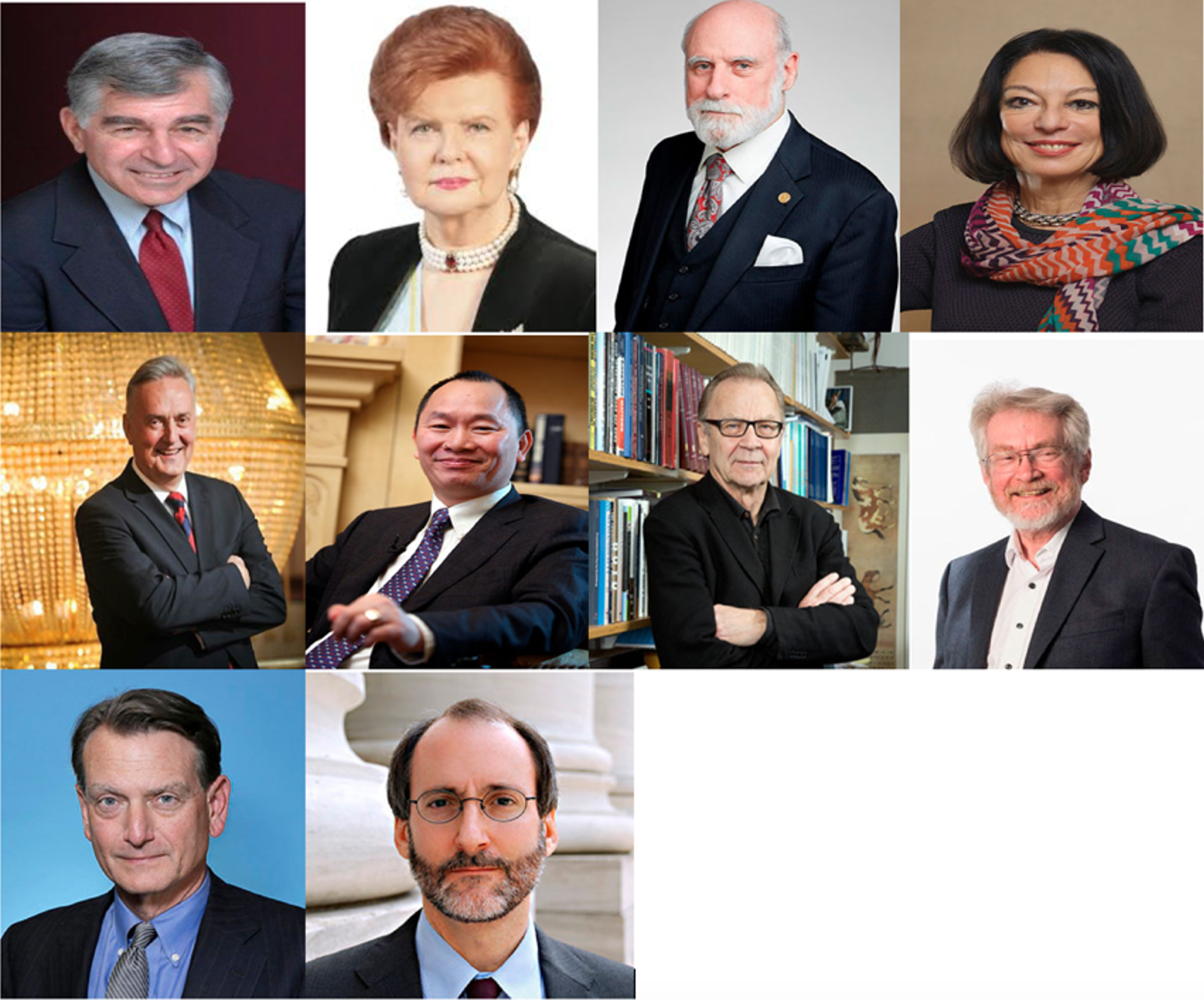
by Editor | Sep 12, 2020 | News
This is the first social contract in the digital, Internet and AI era, a platform for connection among governments, stakeholders, and private and public institutions, and for balancing centers of power, initiated by the Boston Global Forum, will pay particular attention to insights presented by government representatives, academic institutions, think tanks, tech companies and civil society.
The Social Contract for the AI Age was completed and launched on September 9, 2020.
The co-authors of the Social Contract for the AI Age are:
Governor Michael Dukakis, Boston Global Forum and
President Vaira Vīķe-Freiberga, Latvia and World Leadership Alliance-Club de Madrid
Vint Cerf, Father of Internet, Google, Nazli Choucri, MIT,
Prime Minister Zlatko Lagumdzija, Bosnia and Herzegovina,
Tuan Anh Nguyen, Boston Global Forum, Thomas Patterson, Harvard University,
Alex Pentland, MIT, Marc Rotenberg, CAIDP, David Silbersweig, Harvard University
Please view and download Social Contract for the AI Age either here or here.
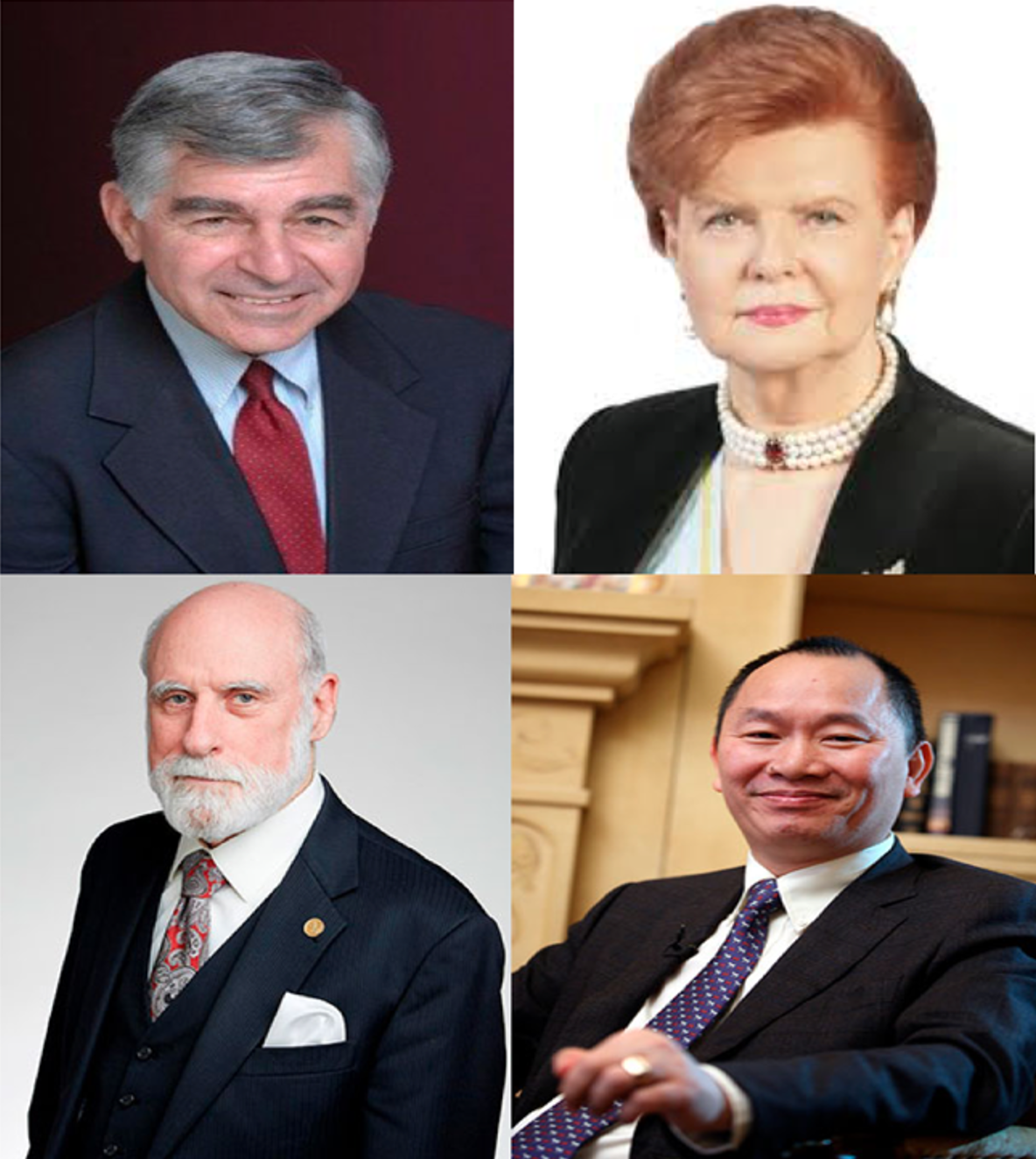
by Editor | Sep 12, 2020 | News
“The Social Contract for the AI Age”, the first social contract in the digital, Internet and AI era, a platform for connection among governments, stakeholders, and private and public institutions, and for balancing centers of power, initiated by the Boston Global Forum, will be officially launched and discussed at Transatlantic Approaches on Digital Governance:
A New Social Contract in the Age of Artificial Intelligence, 16-18 September 2020, organized by World Leadership Alliance-Club de Madrid (https://boston.dialoguescdm.org/agenda/)
Governor Michael Dukakis, President Vaira Vike-Freiberga, father of the Internet Vint Cerf and Nguyen Anh Tuan are four of co-authors invite organizations and individuals sign the Social Contract here.
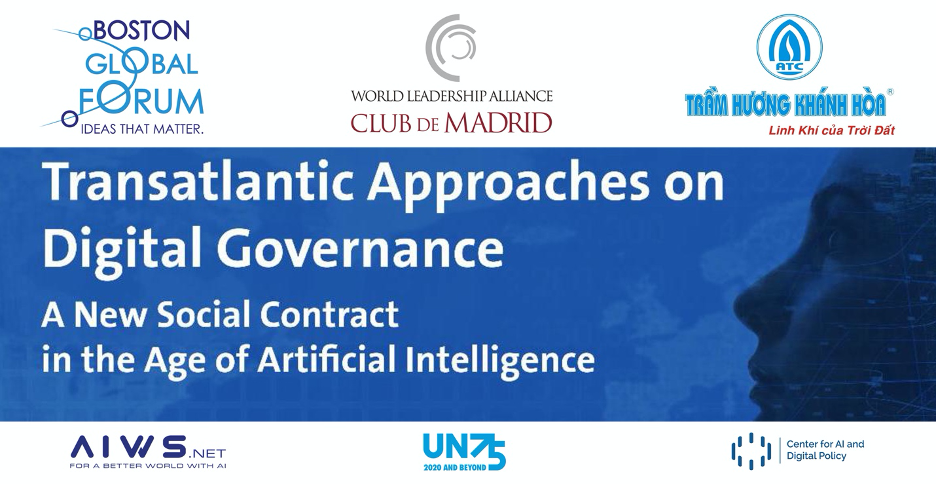
by Editor | Sep 12, 2020 | Event Updates
On 16, 17 and 18 of September 2020, Democratic former Heads of State and Government, Members of Club de Madrid, current Government representatives, experts and renowned scholars will analyse global challenges and offer actionable policy solutions at a transatlantic and multi-stakeholder Policy Lab on the Social Contract for the AI Age, a new social contract on digital technologies and artificial intelligence.
This forthcoming Policy Lab will convene over 10 former democratic Heads of State and Government (all Members of Club de Madrid), Manuel Muñiz, Secretary of State for Global Spain, Ministry of Foreign Affairs, European Union and Cooperation of Spain, as well as world class experts like computer scientist and father of the Internet, Vint Cerf, MIT Professor Alex ‘Sandy’ Pentland, Governor Michael Dukakis, Democratic Party nominee for President of the United States (1988), professors of Harvard, MIT, and top universities. Together, participants will lend their experience-based critical judgement to pioneering discussions which seek, among other priorities, to identify ways of engaging different sectors of society in grounding policymaking while protecting the democratic mandate.
All in all, the rapid rollout of digital technologies and AI beyond the control of states poses a global challenge never seen before, which is why we should not set global, regional and national standards of digital governance without the participation of all societal actors. In this sense, debates from this Policy Lab on “The Social Contract for the AI Age”, the first social contract in the digital, Internet and AI era, a platform for connection among governments, stakeholders, and private and public institutions, and for balancing centers of power, initiated by the Boston Global Forum, will pay particular attention to insights presented by government representatives, academic institutions, think tanks, tech companies and civil society.
The dialogue will also serve as a platform to establish a Transatlantic Alliance for Digital Governance and the AIWS City, an all-digital virtual city based on the standards and norms of “the Social Contract for the AI Age”, “People Centered Economy”, “Trustworthy Economy” and “Intellectual Society”. Lastly, the policy discussion aims to discuss the creation of an initiative to monitor governments as well as companies in using AI and to generate an AI Ethics Index at all levels.
Further information can be found here.
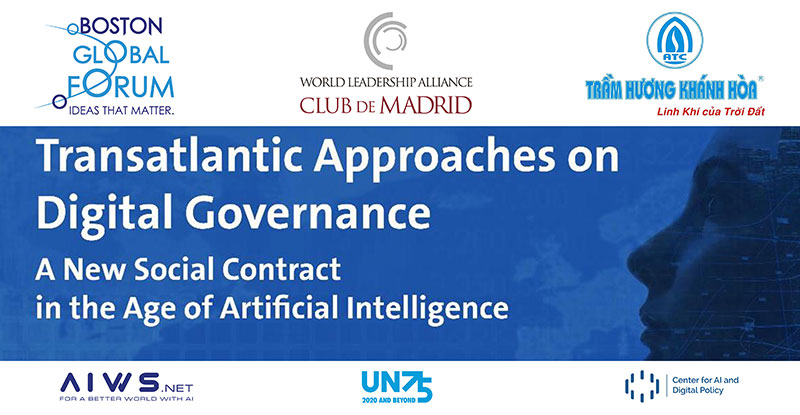
by Admin | Sep 10, 2020 | News
Press Note
16-18 September 2020
Democratic former Heads of State and Government, Members of Club de Madrid, current Government representatives, experts and renowned scholars will analyse global challenges and offer actionable policy solutions at a transatlantic and multi-stakeholder Policy Lab on the Social Contract for the AI Age, a new social contract on digital technologies and artificial intelligence
Madrid, 10 September 2020. In the midst of the current COVID-19 global health emergency, has impacted all spheres of life, humanity has turned to digital technologies and artificial intelligence to face impending challenges. From remote working to financial services and medical equipment, the extent to which we now depend on technology is increasing at a staggering rate. Hospitals are using robots to disinfect rooms, governments have become reliant on complex databases to curb the virus’ spread, and programmers have designed phone apps from which we can remotely control outbreaks. Under the present circumstances, technology seems to be an ally rather than a foe. Still, increasing concern from governments, academics and civil society that this technological transformation may be outpacing policy, must not be overlooked.
In this trying context, World Leadership Alliance-Club de Madrid (WLA-CdM) in partnership with the Boston Global Forum (BGF), and with the generous support of the Tram Huong Khanh Hoa Company (ATC), is organising the Policy Lab “ Transatlantic Approaches on Digital Governance: A New Social Contract in the Age of Artificial Intelligence,”. This multi-stakeholder dialogue will analyse global challenges and offer actionable policy solutions, as we consider the need to create a new social contract on digital technologies and artificial intelligence (AI). By contrasting North American and European best practices and perspectives, Club de Madrid and Boston Global Forum aim to formulate policy recommendations and innovative ideas that will help shape the role of the multilateral system in digital governance and give way to a renewed agreement between society and governments on digitalisation.
To debate these challenges, this forthcoming Policy Lab will convene over 10 former democratic Heads of State and Government (all Members of Club de Madrid) Manuel Muñiz, Secretary of State for Global Spain, Ministry of Foreign Affairs, European Union and Cooperation of Spain, as well as world class experts like computer scientist and father of the Internet, Vint Cerf, chess grandmaster Garry Kasparov, MIT Professor Alex ‘Sandy’ Pentland, Governor Michael Dukakis, Democratic Party nominee for President of the United States (1988), professors of Harvard, MIT, and top universities. Together, participants will lend their experience-based critical judgement to pioneering discussions which seek, among other priorities, to identify ways of engaging different sectors of society in grounding policymaking while protecting the democratic mandate.
Safeguarding citizen rights has become imperative since technology grants substantial power to those who control it. For instance, the technology being used to track citizen movements could potentially pose a violation of privacy rights if misused or left at the hands of non-democratic governments. New communication channels have also been contributing to the rapid spread of fake news about COVID-19, which has generated disinformation and increased confusion.
All in all, the rapid rollout of digital technologies and AI beyond the control of states poses a global challenge never seen before, which is why we should not set global, regional and national standards of digital governance without the participation of all societal actors. In this sense, debates from this Policy Lab on “The Social Contract for the AI Age”, the first social contract in the digital, Internet and AI era, a platform for connection among governments, stakeholders, and private and public institutions, and for balancing centers of power, initiated by the Boston Global Forum, will pay particular attention to insights presented by government representatives, academic institutions, think tanks, tech companies and civil society.
By comparing American and European approaches in the creation of a new social contract on digitalisation, with the foresight of former democratic presidents and prime ministers, this discussion will generate a space to encourage and strengthen transatlantic cooperation around digital governance, in the framework of much needed multilateral reforms and urgent global responses to global challenges like the COVID-19 crisis. The dialogue will also serve as a platform to establish a Transatlantic Alliance for Digital Governance and the AIWS City, an all-digital virtual city based on the standards and norms of “the Social Contract for the AI Age”, “People Centered Economy”, “Trustworthy Economy” and “Intellectual Society”. Lastly, the policy discussion aims to discuss the creation of an initiative to monitor governments as well as companies in using AI and to generate an AI Ethics Index at all levels.
REGISTRATION AND FURTHER INFORMATION
Join us in this Policy Lab “Transatlantic Approaches to Digital Governance: A New Social Contract in the Age of Artificial Intelligence” to be held between 16-18 September.
REGISTER
For further information visit the Policy Lab website.
WEBSITE
ABOUT
World Leadership Alliance-Club de Madrid (WLA-CdM) is the largest assembly of political leaders working to strengthen democratic values, good governance and the well-being of citizens across the globe. As a non-profit, non-partisan, international organization, its network is composed of more than 100 democratic former Presidents and Prime Ministers from over 70 countries, together with a global body of advisors and expert practitioners, who offer their voice and agency on a pro bono basis, to today’s political, civil society leaders and policymakers. WLA-CdM responds to a growing demand for trusted advice in addressing the challenges involved in achieving ‘democracy that delivers’, building bridges, bringing down silos and promoting dialogue for the design of better policies for all. This alliance, providing the experience, access and convening power of its Members, represents an independent effort towards sustainable development, inclusion and peace, not bound by the interest or pressures of institutions and governments.
In 2019 the WLA-CdM launched a ‘Call to Action’ to promote a democratic approach to Digital Transformation and the Future of Democracy, developed during its 2019 Annual Policy Dialogue, whereby it invites world leaders to take proactive action to frame the development of digital technologies in an inclusive, fair and rights-based legal, political and social framework.
The Boston Global Forum (BGF) is a not-for-profit think tank based in Boston, Massachusetts. Its mission is to bring together, in an open and accessible public forum, an eclectic and engaging spectrum of esteemed academic leaders, real-world experts, thought leaders, media experts and promising young leaders, who are dedicated to seeking peaceful solutions to the most contentious issues of our times. An offshoot of The Boston Global Forum, The Michael Dukakis Institute for Leadership and Innovation (MDI) was born in 2015. Its mission is to generate ideas, create solutions, and deploy initiatives to solve global issues, especially initiatives in Cybersecurity and AI World Society Innovation Network (AIWS-IN)
The Artificial Intelligence World Society (AIWS) is a set of values, ideas, concepts and protocols for standards and norms whose goal is to advance the peaceful development of AI to improve the quality of life for all humanity. It was conceived by the Michael Dukakis Institute for Leadership and Innovation (MDI) and established on November 22, 2017. Read more here.
CONTACT
- Further details of WLA-CdM are available by contacting Agustina Briano, Outreach and Development Coordinator of WLA-CdM: [email protected]
- Further details of BGF and AIWS are available by contacting Tuan Anh Nguyen, Co-founder and Chief Executive Officer of The Boston Global Forum, and Director of The Michael Dukakis Institute for Leadership and Innovation: [email protected]
- For press credentials please contact Dick Pirozzolo: [email protected] / +16179594613
- For press inquiries and/or interview requests of WLA-CdM Members, please reach Alejandro Hita, Communications Manager of WLA-CdM: [email protected] / +34607694354
SOCIAL MEDIA
HASHTAG
#DigitalGov
View in PDF format click here

by Admin | Sep 9, 2020 | AIWS and the Age of Global Enlightenment, Highlights

09/09/2020
Original Signatories
Governor Michael Dukakis, Boston Global Forum and
President Vaira Vīķe-Freiberga, Latvia and World Leadership Alliance-Club de Madrid
Additional Signatories
Vint Cerf, Father of Internet, Google, Nazli Choucri, MIT,
Prime Minister Zlatko Lagumdzija, Bosnia and Herzegovina,
Tuan Anh Nguyen, Boston Global Forum, Thomas Patterson, Harvard University,
Alex Pentland, MIT, Marc Rotenberg, CAIDP, David Silbersweig, Harvard University
I. A New Social Contract in the Age of Artificial Intelligence
The term “artificial intelligence” refers to the development of computer systems able to perform tasks that normally require human intelligence, such as visual perception, speech recognition, decision-making, language translation, and self-driving cars. Advances in AI have already altered conventional ways of seeing the world around us. This is creating new realities for everyone – as well as new possibilities.
These advances in AI are powerful in many ways. They have created a new global ecology and yet remain opaque and need to be better understood. Advances in AI raise policy issues that must be assessed. We must now focus through dialogue, tolerance, learning and understanding on key principles and practices for an agreement among members of society for shared social benefit that we call the Social Contract for the AI Age.
The expansion of Artificial Intelligence is widely recognized and could change our lives in ways yet unimagined. At the same time, without guidelines or directives, the undisciplined use of AI poses risks to the wellbeing of individuals and creates possibilities for economic, political, social, and criminal exploitation.
The international community recognizes the challenges and opportunities, as well as the problems and perils, of AI. Many countries have announced national strategies to promote the proper use and development of AI. These strategies set out common goals such as:
- Scientific research, funding and culture,
- Sustainable development, and inclusive growth
- Skills, education, and talent development
- Public and private sector adoption,
- Fairness, transparency, and accountability
- Ethics, values and inclusion,
- Reliability, security and privacy,
- Science-policy links,
- Standards, human control and regulations
- Data and digital infrastructure.
AI is also the focus of foreign policy and international cooperation. There is a shared view that no country will be able to compete or meet the needs of its citizens without increasing its AI capacity. As well, many countries are now engaged in technology leapfrogging. It is no longer expected, nor necessary, to replicate the stages of economic development of the West—one phase at a time.
In a world as diverse as the one today, there are few mechanisms for responding to such possibilities on a global scale. Social Contract for the AI Age is designed to establish a common understanding for policy and practices, anchored in general principles to help maximise the “good” and minimise the “bad” associated with AI. Derived from the 18th century concept of a social contract—an agreement among the members of society to cooperate for social benefits—Social Contract for the AI Age is focuses on the conditions of the 21st century. It is a response to artificial intelligence, big data, the Internet of Things, and high-speed computation.
Foundations
Just as earlier social contracts helped shape societies for a common purpose, the Social Contract for the AI Age has a transformative vision, one that transcends the technological features of artificial intelligence and seeks to provide foundations for a new society. Consider, for example, how the Covid-19 pandemic urgently requires a new society with new structure and order, approach — new ways to share data and coordinate action, accelerated social reliance on digital service across businesses, education, and government services. The Social Contract for the AI Age would create standards for a new international system. It focuses on the conduct of each nation, relations with international business and not for profit entities, and the cooperation of nations. Just as TCP / IP is the platform for communication among internet users, the Social Contract for AI Age is a platform for connection among governments, stakeholders, and private and public institutions.
Objectives
The Social Contract for the AI Age seeks to build a multi-stakeholder, inclusive society in all aspects of life across politics, government, economics, business, and industry. The Social Contract for the AI Age values creation, innovation, philanthropy, and mutual respect. It seeks the right of freedom on, and access to, the Internet worldwide. The Social Contract for the AI Age seeks to make the world a locus of responsible interaction—a place where every person’s contribution is recognized and everyone has a right to knowledge and access to information, where no one is above the law, where money cannot be used to subvert political process, and where integrity, knowledge, creativity, honesty, and tolerance shape decisions and guide policy.
In short, the Social Contract for the AI Age seeks to build a world where all are recognized and valued, and all forms of governance adhere to a set of values and are accountable and transparent. It is a world where global challenges are met by collective action and responsibility.
II. Principles
Extensive and appropriate AI application to politics, governments, society, and businesses can create a Smart Democracy. The Social Contract for the AI Age creates a platform for a Smart Democracy society, and a new global supply chain, named Supply Chain 2020. As a framework for society in the AI age, the Social Contract 2020 is based on balancing power among governments, businesses, civil society, individuals, and AI assistants. The Social Contract for the AI Age is a commitment to protect property, common values, and collective norms.
(1) AI must respect fundamental human rights such as human dignity, rule of law, and privacy protection.
(2) AI systems must be considered from a multi-stakeholder perspective — for the individual and for society as a whole
(3) The Social Contract for the AI Age is a basis to achieve sustainable and inclusive development for a global community that is fair, equitable, and prosperous. It is designed to apply the concept of a people-centered economy and to create a trustworthy AI, data, and Internet ecosystem for work and life.
(4) The Social Contract for the AI Age should be transparent and accountable, and follow standards based on policies driven by trustworthy data. The UN Sustainable Development Goals data metrics and the World Economic Forum Environmental, Social, and Governance (ESG) metrics, should provide citizens and organizations with reliable data that enables well-informed policy choices.
(5) Communities must have control over their data. Data is the basis of self-determination and provides the ability to measure the impact of actions and policy in the AI realm.
(6) Data literacy at all levels of society, together with open, trustworthy information, is the basis for an intelligent, thoughtful society.
III. Commitments of Stakeholders/ Power Centers
(1) Individuals, Citizens, Groups:
- Everyone is entitled to basic rights and dignity that are enhanced/promoted by AI.
Data Rights and Responsibilities:
- Each individual has the right to privacy and is entitled to access and control over their own data. Individuals have a right to manage their data, individually or collectively, and the right to withhold their data from businesses.
- Each individual and each community must have access to a trustworthy AI, data, and Internet ecosystem to create an inclusive, fair, people-centered economy, and society.
Internet Rights:
- Each individual has the right to access the Internet and any website or news system without restriction.
- Freedom of expression on the Internet is guaranteed.
- Secure digital identity allows the individual to know about, and control access to their data.
Education and Political Participation:
Each individual has the right to education through best available venues.
- Each individual must have access to education/knowledge/training about the use and impact of AI.
- Each individual has the right to unimpeded political participation.
- Everyone must have access to due process and fair trial, as well as remediation for injustice.
Responsibility:
- Individuals is prohibited from exercising socially disruptive behaviors, such as hacking, disseminating disinformation or online hate.
- Individuals must contribute to the common good through appropriate taxes and provision of critical personal information (with appropriate data protection) as, for example, in the collection of census data and voting for public officials
(2) Governments. Governments have a leading role in the Social Contract for the AI Age.
- All government should behave responsibly in the management of AI for governance and for interactions with individuals and such behavior must be easily auditable.
- All governments implement AI governance policies that respect honesty, transparency, fairness, and accountability. These standards and norms apply in every area of governance and are the basis for collaboration with international communities.
- All governments create incentives for citizens to use AI in ways that benefit society (for example each person does good work for society that will be recognized as value, and this value can be exchanged with other values such as financial value, products, services, etc.).
- All governments construct a secure, stable, and trustworthy AI, data, and Internet ecosystem for work and life to support the people-centered economy.
- All governments ensure that communities are able take control of their data and use AI with their data so that they can manage their community to suit their needs and to create prosperity for themselves and their family.
- All governments establish norms, rules and pass laws to ensure AI benefits society.
- All governments create secure safety net for citizens in a trustworthy AI, data, and Internet ecosystem for work and life.
- All governments protect intellectual property rights without undermining free access to the information commons.
Collaborations between governments:
- Norms, values and standards of the Social Contract for the AI Age are designed as connections among governments. To maintain the Social Contract for the AI Age, it is essential for countries to establish a Democratic Alliance for Digital Governance. All governments should work to promote the Democratic Alliance for Digital Governance.
United Nations and International Organizations:
- The United Nations should extend international human rights standards for AI, and create a UN Convention on AI and establish a specialized UN Agency on AI
(3)Business Entities. Business operations and related rights come with accountability and responsibility – nationally and internationally. Business must:
- Enable independent audits for transparency, fairness, accountability, and cybersecurity.
- Adopt common AI values, standards, norms, and data ownership rules with penalties for noncompliance.
- Companies will be incentivized to do business only with companies and countries that uphold the Social Contract for the AI Age and endorse Supply Chain 2020.
- Collaborate with governments and civil society to help create a people-centered AI, data, and Internet ecosystem, to create trustworthy and relevant data, and to use AI to share wealth with individuals and communities.
(4) Civil Society Organizations & Community. Rights and responsibilities of civil society organizations include:
- Monitor governments and firms with respect to common values.
- Promote common values, norms, standards, and laws.
- Support AI users and assist them to serve the broad interests of society.
- Collaborate with governments, business entities, and others to create a people-centered AI, data, and Internet ecosystem for work and life, enabling all people can create meaningful data, value, and create value-based wealth for their community.
- Enable data cooperatives—the voluntary collaborative pooling by individuals of their personal data for the benefit of the group or community.
- Participate in the making of AI rules and norms.
- Enhance civil society become an intelligent, thoughtful civil society based on knowledge, smart data, critical thinking and social responsibility; and through the achievement of data literacy, to become a trusted open-data system, with validated, predictive AI tools that communities to plan their future.
(5) AI Assistants. AI assistants provide an interface to facilitate compliance with established standards.
- Support AI users and assist them to serve the broad interests of society.
- Engage with other power centers for mutual support and supervision.
- Community control: AI assistants should be governed by communities of users.
IV. Implementation. The Social Contract for the AI Age will be implemented as follows:
- The promulgation of a Code of Ethics for AI Developers and AI Users.
- The creation of a system to monitor and evaluate governments, companies, and individuals (based on their contribution to maintaining norms, standards, common values, and international laws for honesty, transparency, accountability, and responsibility).
- The recognition of the Social Contract for the AI Age by the United Nations, governments, companies, civil society and the international AI community.
- The establishment of a United Nations Convention on Artificial Intelligence to obligate governments and others to comply with international rules and norms to protect rights in AI age.
- The development of the Democratic Alliance for Digital Governance as the global authority to enforce the Social Contract for the AI Age.
- The creation of the “AIWS City”—an all-digital virtual city based on the standards and norms of “the Social Contract for the AI Age”, “People Centered Economy”, “Trustworthy Economy”, “AI-Government”, and “Intellectual Society-Thoughtful Civil Society”.
Download PDF here
Social Contract for the AI Age is now open for signature by others HERE

by Editor | Sep 6, 2020 | News
The Social Contract 2020, A New Social Contract in the Age of AI, version 2.0, will be officially completed on September 9, and will be launched at the Policy Lab “Transatlantic Approaches on Digital Governance – A New Social Contract on Artificial Intelligence”, co-organized by World Leadership Alliance-Club de Madrid and the Boston Global Forum, on 16-18 September 2020.
In Session I: The AIWS Social Contract 2020 and AIWS Innovation Network: A Platform for Transatlantic Cooperation, Presidents, Prime Ministers, distinguished thinkers, and innovators together with Nguyen Anh Tuan, CEO of the Boston Global Forum, and Vint Cerf, Father of the Internet, Chief Internet Evangelist of Google, will discuss the Social Contract 2020, AIWS.net, and AIWS City as a practice of the Social Contract 2020 and a platform for Transatlantic Cooperation.
Former Prime Minister of Bosnia and Herzegovina, Zlatko Lagumdžija, joins as co-author of the Social Contract 2020, and a Mentor of AIWS Innovation Network (AIWS.net), and the AIWS City Board of Leaders, the History of AI Board.
An experienced political leader, professor in computer science, and economics, member of World Leadership Alliance-Club de Madrid, and from a special country, PM Lagumdžija plays a significant role and has great contributions to the Social Contract 2020, AIWS.net, and AIWS City.
“We are thrilled that Zlatko Lagumdžija is joining us,” said Governor Michael Dukakis. “We are all very impressed by his breadth of knowledge, achievements and his passionate commitment to fundamental rights and democratic governance.”
Prime Minister Lagumdžija said:” I am very honored to join the Board of AIWS Innovation Network (AIWS.net), AIWS City, the History of AI, and co-author of the Social Contract 2020. We must ensure that new technologies — and AI in particular — promote a better world.”
Lagumdžija is a speaker at Policy Lab “Transatlantic Approaches on Digital Governance – A New Social Contract on Artificial Intelligence”

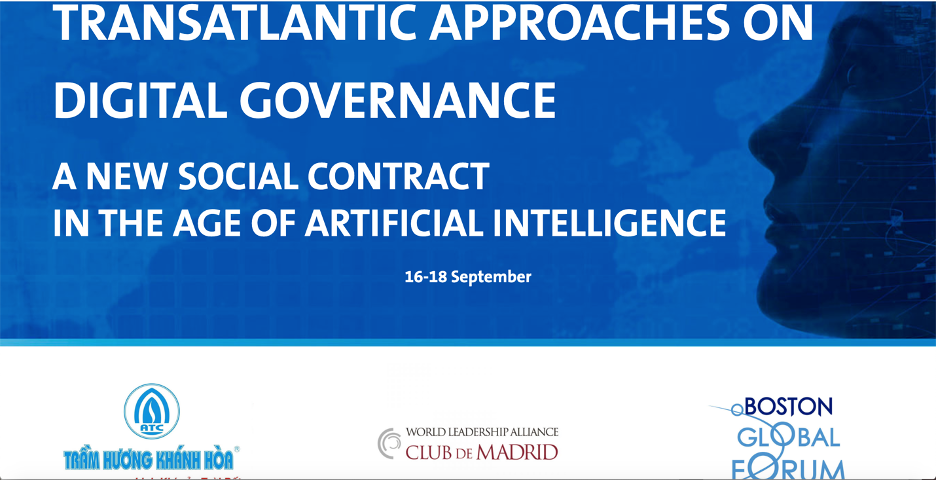
by Editor | Sep 6, 2020 | News
Club de Madrid, in partnership with the Boston Global Forum, and with the generous support of Tram Huong Khanh Hoa Company (ATC), presents a Policy Lab will be analysing challenges to digital and AI governance from a transatlantic perspective and offer actionable policy solutions as we consider the need to build a new social contract that will adequately tackle these challenges.
Leaders of the Boston Global Forum and AIWS.net, such as Governor Michael Dukakis, Father of the Internet Vint Cerf, Prime Minister Zlatko Lagumdzija, Nguyen Anh Tuan, Marc Rotenberg, professors Thomas Patterson, Nazli Choucri, David Silbersweig, Alex Pentland, will attend and present the Social Contract 2020 at this special event on 16-18 September 2020.
By contrasting North American and European best practices and perspectives, Club de Madrid and the Boston Global Forum aim to delve into innovative ideas and formulate actionable policy recommendations and consider the need to build a new social contract that will adequately tackle the challenges raised by artificial intelligence and digital governance. Both organizations will look to identify ways of engaging technological companies in public policy making while protecting the democratic mandate, which guarantees policies that serve the general interest, rather than that of fewer actors.
https://boston.dialoguescdm.org/
http://www.clubmadrid.org/policy-lab-transatlantic-approaches-on-digital-governance-a-new-social-contract-on-artificial-intelligence/
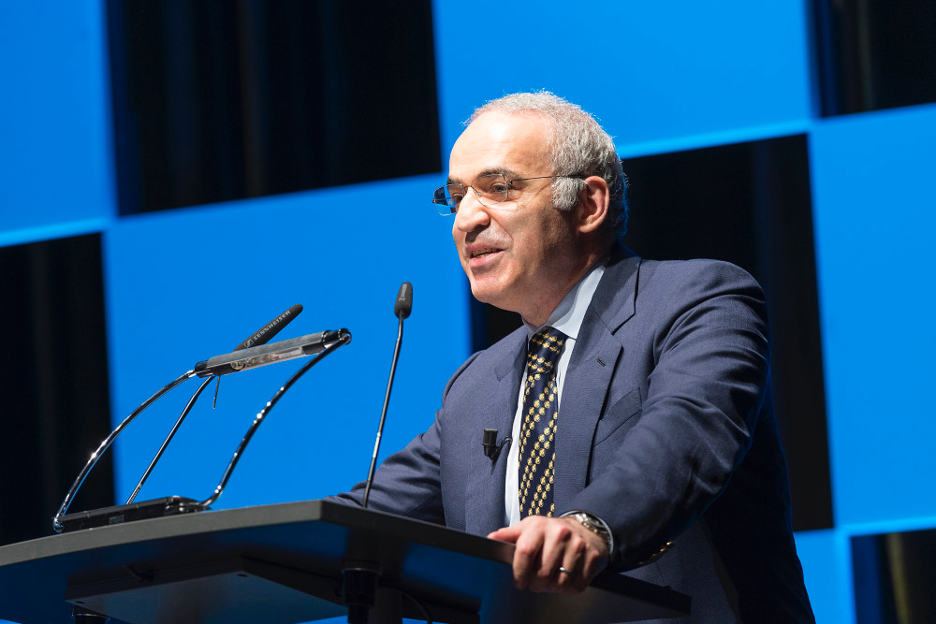
by Editor | Sep 6, 2020 | Event Updates
Club de Madrid, in partnership with the Boston Global Forum, presents a Policy Lab to analyze current global challenges from a transatlantic perspective and offer ensuing policy solutions on digital technologies and artificial intelligence. This is a special 3-day event from September 16-18, 2020 with attendance of political leaders, distinguished thinkers, and innovators. The Boston Global Forum will launch and present “the Social Contract 2020, A New Social Contract in the Age of AI” and the AIWS City at this event.
World Chess Champion Garry Kasparov, author of “Deep Thinking” is a speaker at “Transatlantic Approaches on Digital Governance – A New Social Contract on Artificial Intelligence” Conference.
World Leadership Alliance-Club de Madrid (WLA-CdM) is the largest worldwide assembly of political leaders working to strengthen democratic values, good governance and the well-being of citizens across the globe.
As a non-profit, non-partisan, international organization, its network is composed of more than 100 democratic former Presidents and Prime Ministers from over 70 countries, together with a global body of advisors and expert practitioners, who offer their voice and agency on a pro bono basis, to today’s political, civil society leaders and policymakers. WLA-CdM responds to a growing demand for trusted advice in addressing the challenges involved in achieving democracy that delivers, building bridges, bringing down silos and promoting dialogue for the design of better policies for all.
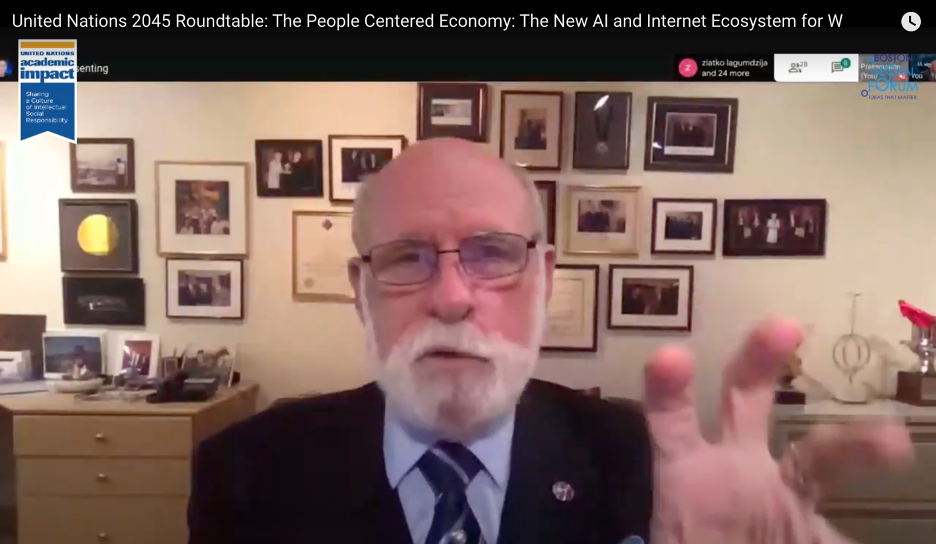
by Editor | Aug 30, 2020 | Event Updates
The Policy Lab on Transatlantic Approaches on Digital Governance: A New Social Contract in the Age of Artificial Intelligence, will be held in a virtual format over a three-day period between the 16th and the 18th of September, hosted by The World Leadership Alliance-Club de Madrid (WLA-CdM) and the Boston Global Forum (BGF).
The COVID-19 outbreak and ensuing global health crisis have significantly accelerated the deployment and decentralization of digital technologies and Artificial Intelligence (AI). Their role
in almost every facet of today’s life merits in-depth analysis, particularly timely in the current context, when their use will present us with both challenges and opportunities, concerns and solutions.
Our Policy Lab will bring the governance experience of World Leadership Alliance-Club de Madrid Members, democratic former Presidents and Prime Ministers from over seventy countries, together with the knowledge of experts and scholars in a multi-stakeholder, multidisciplinary platform aimed at generating action-oriented analysis and policy recommendations for the development of a new social contract on digital governance. All this, from a Transatlantic perspective and with the experience of a ravaging, global pandemic that has underlined the need to strengthen international cooperation and the multilateral system as we build a digital future for all. Through the voice and agency of WLA-CdM Members, WLA-CdM and BGF will bring the results of this discussion to the global conversation steered by the UN as part of its 75th anniversary and other major action-oriented discussions taking place on this most pressing topic.
Vint Cerf, Father of the Internet; Nguyen Anh Tuan, CEO of BGF; the former Prime Minister of Finland, former President of Latvia, former Prime Minister of Bosnia and Herzegovina, and professors of Harvard and MIT will speak at the Session I: The AIWS Social Contract 2020 and AIWS Innovation Network: A Platform for Transatlantic Cooperation, on September 17th at 9:30 EDT.










